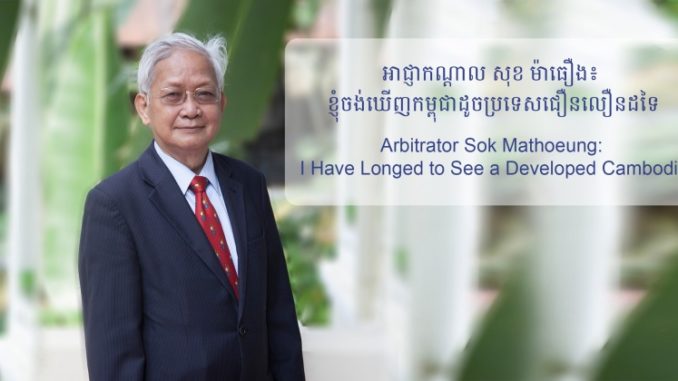
Dr. Sok Mathoeung is referred by almost all arbitrators and staff members at the Arbitration Council Office as “Mentor”. This reference does not reflect that they are all his students or former ones, but it shows the sense of respects for his seniority at the AC and the Arbitration Council Foundation (ACF) of which he was the first Chairman of the Board of Directors since its inception in 2004.
Arbitrator Mathoeung is one of the Khmer scholars, who has always been firmly committed to the economic and legal development of Cambodia during the constant fluctuation of political regimes as well as situations from peace to chaos and its return to normality.
Born in 1938 in Kandal province, Matoeung studied really hard until he graduated from the National School of Agriculture in 1962. From there, while working as a civil servant under the Department of Fishery, Ministry of Agriculture, he earned a Bachelor of Economics from Faculty of Laws and Economic Science in 1969. Soon after his graduation, he was awarded a scholarship for a one-year study tour on forestry in France. Upon his arrival, he took the opportunity to earn another Bachelor’s Degree of French Literature from the University of Paris I. Though he just recently received this Bachelor’s Degree, once he saw an announcement about registration for entrance exam for a Master of Economics class, he immediately registered for the exam, but his attempt was foiled by a coup d’état in Cambodia in 1970 when the new government recalled all government civil servants studying abroad back to Cambodia.
During the chaos following the coup d’état, Mathoeung tried to apply for a scholarship to study again and this time, he made it; he earned a Master’s Degree of Economics and also pursued to finish a Doctorate of Economics with the second class of hornour from University of Paris I in 1976.
Referring to the political situation in Cambodia, after swiftly grabbing power, Democratic Kampuchea (Khmer Rouge regime) campaigned to convince Cambodian scholars abroad to return to Cambodia for what it claimed was to help rebuild and redevelop Cambodia.
Upon hearing the propaganda, which was in line with his commitment to bring back knowledge learnt abroad to serve his mother land through public service, Mathoeung decided to return to Cambodia.
By late 1976, once stepping into Cambodia, he was perplexed and completely overwhelmed by the tranquility and lifelessness of Phnom Penh. He was then transported to and put into custody inside Boeung Trabek Primary School.
In early 1977, after three months under custody, he was moved to work in a collective community at Stoeung Trang district, Kampong Cham province.
After the collapse of Khmer Rouge regime, seeing that Cambodia was not stable yet, the United Nations High Commission for Refugee (UNHCR) assisted him to move to France for safety.
During his time in France, Mathoeung worked as a consultant to French government agencies as well as a professor at University of Paris I, II, and VIII. He also once had undertaken a mission to be an Economic Consultant to Africa from 1984 to 1992.
Though working miles away from Cambodia, he kept following political updates in Cambodia to spot an opportunity to return to his motherland. Witnessing a Paris Agreement as well as hurt by news about deaths and fighting between Cambodian fellows, in 1992, he contacted UNHCR before returning to Cambodia and agreed to work as a translator for them due to his fluency in both French and Khmer.
In 1993, in his contribution to peace keeping in Cambodia for the first time, he was an International Polling Station Officer at Preak Tamak.
In his last trip to Cambodia, Mathoeung worked as a Consultant to international organisations including the Asia Development Bank (ADB), Work Bank, Senior Professor in various universities, Royal School of Administration, Ministry of Public Works and Transportation, and Centre for Lawyer Training to contribute his knowledge and experience gained from his membership in well-known French institutions: Finance Association, Centre for Mediation and Arbitration, and New Development Association.
Thanks to this knowledge and experience, Mathoeung was selected to be an arbitrator by the Ministry in Charge of Labour and International Labor Organization (ILO) when the AC was initially formed in 2003.
“I have longed to see Cambodia with alternative dispute resolution mechanism like other developed nations”, he spoke about his wish to be involved in AC’s work.
Mathoeung added that he observed that developed nations had effectively employed alternative dispute resolution, so he wished to bring his experiences from his membership in the French Centre for Mediation and Arbitration to help contribute to the AC in Cambodia.
Referring to the current status of the AC’s work, without hesitance, Mathoeung claimed, “I am proud to be an arbitrator at AC because it is transparent and free from corruption”.
For the future, he added, we have a lot more work to do to keep the AC sustained since services for collective labour dispute resolution in Cambodia is different from that of France. As stipulated in the Labour Law, the service was provided for free of charge in Cambodia while in France, service users were charged.
Mathoeung said, personally, he wished to see the AC expand its jurisdiction to provide service for individual labour dispute resolution even though a labour court will be established.
“As long as we maintain our values by being neutral, transparent, and free from corruption, we will be able to sustain”, Methoeung expressed his firm belief.
